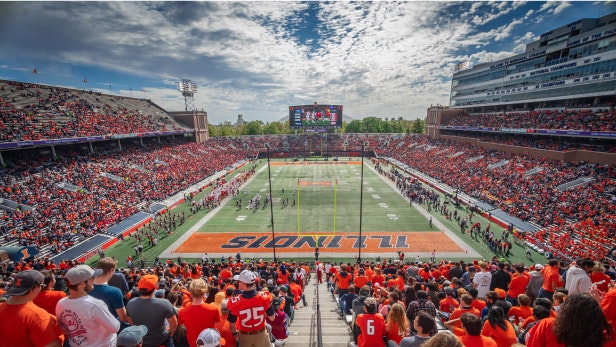Game Day Security: The University of Illinois’ Landmark Drone Arrest
January 6th, 2025It’s college football bowl season—the stands are packed, the tailgates are in full swing, and fans are glued to every play. But while everyone’s attention is on the field, campus security teams are focused on something far more critical: keeping tens of thousands of people safe. Managing a crowd that size is tough enough, but throw in the growing threat of drones, and it’s a whole new ballgame.
Drone sightings at stadiums are on the rise—up 20% annually with over 2,800 reported at NFL games last year alone—and these aren’t just harmless gadgets. Unauthorized drones can disrupt games, endanger spectator safety, and create serious stadium security risks. For the University of Illinois, one drone incident at Memorial Stadium proved just how high the stakes can get.
With over 55,000 students, a Big Ten stadium that holds 85,000 fans, and even a commercial airport on campus, U of I’s campus security team navigates a complex environment to ensure student safety. Things hit a breaking point, though, when a rogue drone flew into the stadium, capturing sensitive images of critical security positions.
When drones interrupt game day
It was the third quarter of a football game when a rogue drone zipped into Memorial Stadium, hovering dangerously close—within 10 feet—of SWAT officers stationed on overwatch. The drone captured images of their positions, exposing a significant stadium security vulnerability.
Captain Joe McCullough of the University of Illinois Police Department deployed a team of 14 officers to locate the operator, but despite their best efforts, the person responsible couldn’t be found.
“We relied solely on line-of-sight monitoring. We would try to track where a drone landed and send officers to find the pilot, but I can count on one hand the times we succeeded,” McCullough explained. “It was all down to luck—identifying offending operators by line of sight is nearly impossible."
With nearly 500 drone sightings over campus each month, the university needed more than luck to prevent a potential drone attack. They needed a system that could provide real-time situational awareness of their airspace and allow them to respond effectively.
A new approach to tackling drone threats
Determined to close the gap in their campus security, the University of Illinois implemented SkySafe’s cloud-based drone detection and forensics system. Within 24 hours, the system was fully installed and operational—ready in time for the next football game. This gave the university’s police department access to:
- Real-time alerts via text and email when drones enter or approach restricted airspace
- Color-coded mapping to distinguish between approved and unknown drones at a glance
- Forensic reports to aid investigations and build strong legal cases
SkySafe’s involvement didn’t end with the installation—we were on-site at Memorial Stadium, working closely with the university’s police department to provide hands-on training. “SkySafe’s support was phenomenal,” McCullough shared. “They were there with us during the first game, offering real-time training and ensuring we were fully prepared to use the system.”
In its first year, the system logged over 7,500 drone flights in the university’s airspace. While most were harmless hobbyist flights, the sheer number highlights the challenge of distinguishing between benign and potentially dangerous drones—something manual methods simply couldn’t handle.
From breach to landmark arrest
SkySafe quickly proved its worth during a sold-out game against the University of Kansas on September 7. In the third quarter, a drone breached the stadium’s airspace, hovering ominously over the 50-yard line. This time, SkySafe instantly pinpointed the operator’s location: a fourth-floor balcony half a mile away.
Within minutes, officers located and apprehended the operator. This real-time response prevented what could have escalated into a more serious drone attack, keeping fans, students, and players safe.
Using SkySafe’s forensic data, police confirmed the drone’s flight path and no-fly zone violation. The data also revealed the operator’s history of reckless behavior, including flights over densely populated campus events.
The operator was charged with reckless conduct under Illinois state law, and the case was forwarded to the FAA. The arrest and prosecution set a precedent for campus drone enforcement and demonstrated the practical value of SkySafe’s drone forensic capabilities.

Preventing threats and protecting revenue
SkySafe has transformed how the University of Illinois addresses drone threats. With early detection and real-time alerts, the system helps the security team stay ahead of potential airspace violations at football games, commencement ceremonies, and other big events. Monitoring a 10-mile radius—including Memorial Stadium, the airport, and campus quad—SkySafe has turned what once felt impossible into an effortless process.
And the benefits don’t stop at campus security. SkySafe has also introduced significant operational and financial benefits, including:
- Optimized resource use: Drone incidents that once required 15 officers to handle now need just one or two, freeing up security staff for other critical tasks.
- Proactive risk reduction: The ability to arrest and prosecute drone operators has deterred reckless drone activity, improving overall student safety.
- Revenue protection: By preventing game delays and interruptions, the system helps safeguard valuable broadcasting agreements with major networks like CBS and ESPN.
Enhancing spectator safety with drone detection
As drone sightings increase over campuses, athletic events, and concerts, the risks to campus safety and security grow—from costly game delays to dangerous drone attacks. Despite bans from organizations like the NFL, MLB, and NCAA, unauthorized drones still find their way into restricted airspace, leaving even the most prepared stadiums vulnerable.
The University of Illinois serves as a model for what’s possible with a proactive approach to airspace security. By integrating advanced drone detection technology, they’ve not only improved campus safety but also created a blueprint for protecting large-scale events. With SkySafe, they’ve turned a major vulnerability into a story of success—one that allows fans to enjoy the action without worrying about what’s flying overhead.
Curious how drone detection could improve your campus security?
Check out the full case study to see how the University of Illinois tackled rogue drones.
Ready to take action? Schedule a demo!

